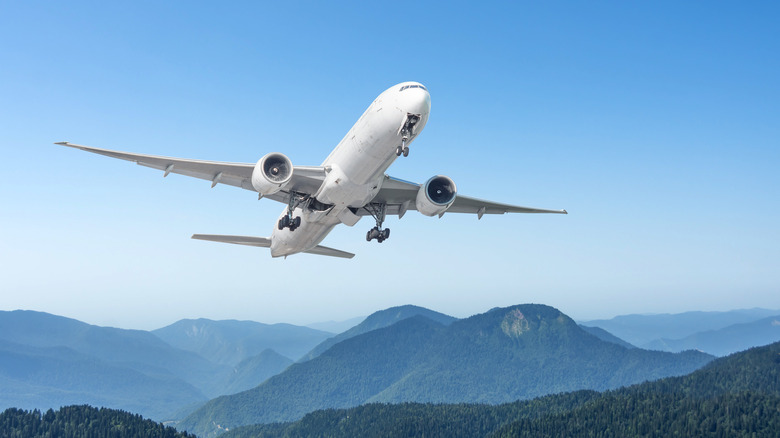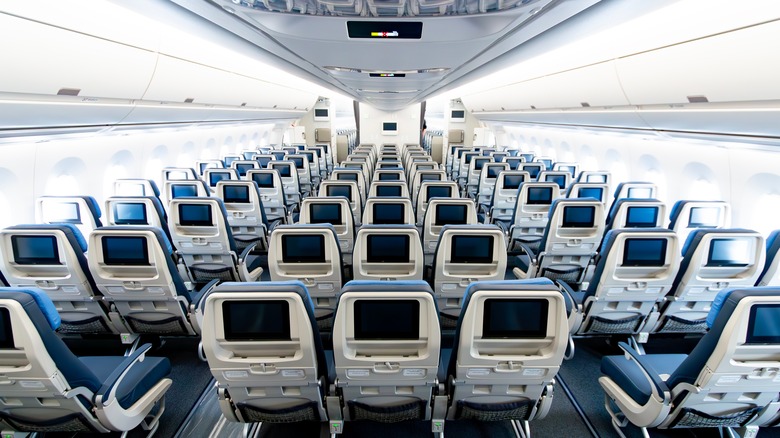The Unexpected Reason Rick Steves Refuses To Sign Up For Any Airline Loyalty Programs
Many people in the U.S. and abroad are members of airline loyalty programs or use certain credit cards in order to gain miles and points to fly "for free." According to research by Simple Flying, the Delta, United, and American Airlines loyalty programs boast over 100 million members each, and there are programs with airlines all over the world. The rewards for being part of these programs can be attractive. In addition to collecting miles to put towards future flights — and sometimes paying next to nothing for a journey — perks include free checked baggage, lounge access, and complimentary upgrades. So why does Rick Steves, America's favorite European travel expert, refuse to sign up for any airline loyalty programs?
Steves spoke to The Washington Post about his rejection of the miles and points game, saying that loyalty programs "bully us into complicating our lives." While he doesn't explain what he means by this, airline loyalty programs can definitely make buying flights more complex, from doing the miles math before you buy to being tied to a certain carrier.
Are airline loyalty programs making life more complicated?
The short answer is yes. Loyalty programs make our lives more complicated. First, calculating the number of miles you earn per flight has been getting more convoluted for years. Airlines are also known to devalue miles and make them more difficult to use after you earn them. We don't need to tell you how annoying that can be. In addition, buying points and miles might not be saving you as much as you think. That means that playing the game of maximizing your miles might not even be worth the hassle.
You also need to keep an eye on if and when your miles expire. You may feel pressured to book a trip before they do and end up, for example, visiting the U.K. in damp, dark February rather than in the profoundly more pleasant summer months. Loyalty programs tend to encourage you to stick with a certain airline, too. If you're a member of Delta's SkyMiles program, you might feel like you should book with that airline instead of jumping on a cheaper and perhaps more convenient flight with another carrier.
Finally, that leads to another issue with airline loyalty programs. They work well if you're flexible but less well if you need to be in a certain place at a certain time and your preferred airline doesn't fly there. By doing as Rick Steves does and opting out of loyalty programs, you're likely to feel more free to book the flights you actually want.
Rick Steves' controversial views on flying
Steves' disclosure that he doesn't like airline loyalty programs is fairly surprising coming from someone who flies regularly — he could rack up a ton of miles and points and fly business class for free. But Steves also revealed to The Washington Post that he doesn't fly business class at all, preferring to sit in economy. In fact, he believes airlines should only have one class.
The Washington Post writes that this is part of Steves' "egalitarian worldview." We wonder if it also has something to do with the fact that flying in business can double or even triple your carbon footprint when compared to flying economy. Steves is committed to fighting climate change, and his company, Rick Steves' Europe, has a self-imposed carbon tax. Flying economy isn't just more equalizing; it also has less of an environmental impact.
Forgoing loyalty programs and business class seats aren't Steves' only controversial views on flying. In the Washington Post article, he said, "As long as I've got an aisle and a seat that reclines, I'm happy." Yep: Rick Steves is Team Recline. Airplane seat reclining etiquette is constantly up for debate, but it's good to know where Steves sits on the issue.


